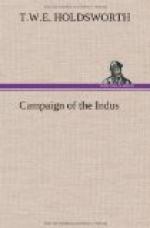“We are all delighted at it. Few armies have made so long a march in the same time that the army of the Indus has done. The country is every day improving. The road to Candahar from where we are now encamped lies in a continued valley seldom stretching in width above two miles; cultivation on each side of the road, and numberless villages nestling under the hills. Since we left Ghuzni, the fruits have assumed a very fine appearance; the grapes, plums, and apples have become very large, like their brethren of Europe. The climate now is very fine. The rapid Loghurd river is flowing close to our encampments, and the European soldiers and officers are amusing themselves with fishing in it. We are beginning to get vegetables again. I passed this morning through fields of beans, but only in flower. Our attention must be turned to the cultivation of potatoes; they grow in quantities in Persia, and this seems to be just the country for them. To revert from small things to great: a party has just been detached towards Bamian with a view of cutting off Dost Mahomed. It would be a great thing to catch him. The party consists chiefly of Afghans, headed by Hajee Khan Kaukur, and about eight or ten British officers have been sent with it, to prevent the Afghans from committing excesses.”
FROM THE
LONDON GAZETTE EXTRAORDINARY,
Thursday, Feb. 13th.
INDIA BOARD, FEB. 13TH.
A despatch has been this day received at the East India House, addressed by the Governor-General of India to the Select Committee of the East India Company, of which the following is a copy:—
“Camp at Bhurtpore, Dec. 12th, 1839.
“I do myself the honour to forward copies of the despatches noted in the margin, relative to the assault and capture of the fort of Kelat.
“2. The decision, the great military skill, and excellent dispositions, of Major-General Willshire, in conducting the operations against Kelat, appear to me deserving the highest commendation. The gallantry, steadiness, and soldier-like bearing of the troops under his command rendered his plans of action completely successful, thereby again crowning our arms across the Indus with signal victory.
“3. I need not expatiate on the importance of this achievement, from which the best effects must be derived, not only in the vindication of our national honour, but also in confirming the security of intercourse between Sinde and Afghanistan, and in promoting the safety and tranquillity of the restored monarchy; but I would not omit to point out that the conduct on this occasion of Major-General Willshire, and of the officers and men under his command, (including the 31st regiment of Bengal Native Infantry, which had not been employed in the previous active operations of the campaign,) have entitled them to more prominent




